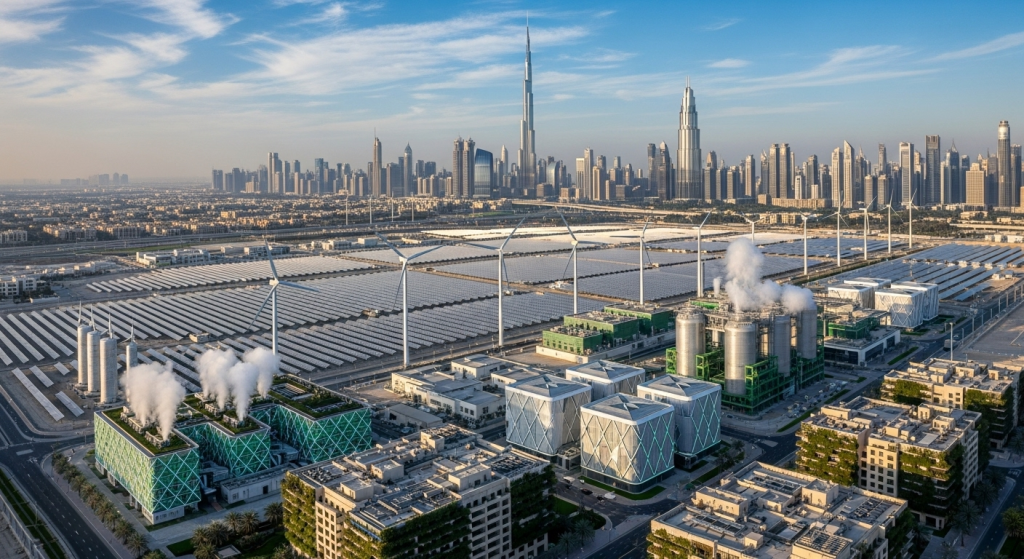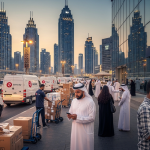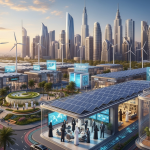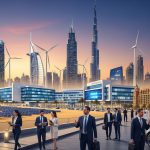Dubai continues to position itself as a global leader in sustainability, with significant strides in its renewable energy sector in 2025. As part of its ambitious Dubai Clean Energy Strategy 2050, the emirate is rolling out groundbreaking projects and initiatives aimed at achieving a carbon-neutral future while creating lucrative opportunities for investors and businesses. This article explores the latest developments in Dubai’s renewable energy landscape, the economic implications for stakeholders, and how these advancements align with the emirate’s broader vision for sustainable growth.
Major Renewable Energy Projects Driving Growth in 2025
Dubai’s commitment to renewable energy is evident in the scale and innovation of its projects. One of the most notable developments in 2025 is the expansion of the Mohammed bin Rashid Al Maktoum Solar Park, which remains the largest single-site solar park in the world. The park is on track to achieve its target of generating 5,000 MW by 2030, with new phases being commissioned this year to boost capacity. These expansions not only contribute to Dubai’s clean energy goals but also create a ripple effect in the economy by generating demand for advanced technologies, skilled labor, and ancillary services.
Additionally, Dubai Electricity and Water Authority (DEWA) has announced partnerships with international firms to introduce cutting-edge energy storage solutions. These systems, including large-scale battery storage, are designed to ensure a stable power supply from renewable sources, addressing one of the key challenges in solar energy adoption. This move is expected to attract tech-focused investors looking to tap into the growing market for energy storage solutions in the region.
Another significant initiative is the rollout of green hydrogen projects, with Dubai positioning itself as a hub for this emerging technology. Pilot projects in 2025 are exploring hydrogen production using solar power, aligning with global trends toward decarbonization in industries such as transportation and manufacturing. These projects signal Dubai’s intent to diversify its renewable energy portfolio beyond solar and wind, opening new avenues for collaboration with global energy giants.
Policy Support and Incentives Fueling Investment
The Dubai government has introduced a series of policies and incentives in 2025 to encourage private sector participation in the renewable energy sector. These include tax exemptions, subsidies for research and development, and streamlined licensing processes for companies involved in clean energy projects. The emirate’s free zones, such as the Dubai Multi Commodities Centre (DMCC), are also playing a pivotal role by offering tailored packages for renewable energy firms to set up operations.
For businesses and investors seeking to navigate these opportunities, partnering with a trusted consultancy can make a significant difference. Persian Horizon, a UAE-based investment and business consultancy firm, provides expert guidance on entering Dubai’s renewable energy market. Their comprehensive resources, including insights shared on their Blog, offer valuable information on market trends and regulatory frameworks.
Moreover, the Dubai Supreme Council of Energy has launched initiatives to support small and medium enterprises (SMEs) in adopting renewable energy solutions. These programs include financial assistance for installing solar panels and energy-efficient systems, making sustainability accessible to businesses of all sizes. For tailored support in leveraging these incentives, companies can explore Services offered by specialized consultancies to maximize benefits.
Economic Impact and Investment Opportunities
The renewable energy sector’s growth in Dubai is creating a robust ecosystem for investment. According to recent reports, the emirate’s focus on clean energy is expected to contribute significantly to GDP growth, with projections estimating billions of dirhams in economic output over the next decade. Sectors such as construction, technology, and logistics are seeing increased activity due to the demand for infrastructure, equipment, and services related to renewable energy projects.
For investors, the opportunities are diverse. From funding large-scale solar farms to investing in startups developing innovative energy solutions, Dubai offers a range of entry points. The emirate’s strategic location as a gateway between East and West further enhances its appeal, providing access to markets across the Middle East, Africa, and Asia. Those looking for expert advice on capital allocation in this sector can benefit from Investment Consulting Services to identify high-potential projects.
Furthermore, the renewable energy boom is fostering job creation across various skill levels. Roles in engineering, project management, and technical support are in high demand, contributing to Dubai’s reputation as a hub for talent in emerging industries. This trend also underscores the importance of human resources strategies for companies entering the market, ensuring they attract and retain the right expertise.
Challenges and Considerations for Stakeholders
While the prospects are promising, stakeholders must navigate certain challenges to succeed in Dubai’s renewable energy sector. High initial capital costs for projects like solar farms and green hydrogen facilities can be a barrier for smaller players. Additionally, the rapid pace of technological advancement requires companies to stay ahead of the curve, investing in continuous innovation to remain competitive.
Regulatory compliance is another critical factor. While Dubai has simplified many processes, businesses must ensure adherence to local standards and environmental guidelines. Engaging with experienced consultants for Business Setup Services can streamline the process of establishing operations in compliance with these regulations.
Regional and Global Implications of Dubai’s Renewable Energy Push
Dubai’s advancements in renewable energy are not only transforming its local economy but also influencing the broader Gulf region. Neighboring countries are taking note of Dubai’s success and exploring similar initiatives, potentially leading to collaborative projects that enhance regional energy security. The emirate’s leadership in green hydrogen, for instance, could pave the way for a regional hydrogen economy, with Dubai as the central hub.
On a global scale, Dubai’s renewable energy initiatives align with international commitments to combat climate change, such as the Paris Agreement. By showcasing scalable models of clean energy adoption, Dubai is positioning itself as a key player in the global sustainability agenda. This enhances its attractiveness to multinational corporations seeking to align their operations with environmental, social, and governance (ESG) principles.
For businesses looking to expand or sell their operations in this dynamic sector, platforms offering Business Sales Services can facilitate connections with potential buyers. Similarly, investors interested in acquiring stakes in renewable energy firms can explore Business Buying Services to identify strategic opportunities.
Marketing and Visibility in the Renewable Energy Sector
As competition intensifies in Dubai’s renewable energy market, effective marketing and advertising strategies are essential for companies to stand out. Highlighting innovation, sustainability credentials, and alignment with Dubai’s vision can resonate with both local and international audiences. Firms can leverage specialized Sales and Advertising Services to craft targeted campaigns that amplify their presence in this sector.
Additionally, staying informed about the latest developments is crucial for stakeholders. Regularly updated News platforms provide real-time insights into policy changes, project announcements, and market shifts that impact the renewable energy landscape.
Future Outlook for Renewable Energy in Dubai
Looking ahead, Dubai’s renewable energy sector is poised for exponential growth. The emirate’s leadership has set ambitious targets, including generating 75% of its energy from clean sources by 2050. Achieving this will require sustained investment, innovation, and collaboration between public and private entities. Emerging technologies such as floating solar farms and advanced wind energy systems are already on the horizon, promising to further diversify Dubai’s energy mix.
For foreign nationals and investors looking to establish a long-term presence in Dubai through renewable energy ventures, securing residency can be a strategic move. Specialized Residency and Citizenship Services can assist in navigating the legal pathways to establish a foothold in the emirate.
Conclusion
Dubai’s renewable energy sector in 2025 represents a dynamic and rapidly evolving market, offering substantial opportunities for investors, businesses, and professionals. With landmark projects, supportive policies, and a clear vision for sustainability, the emirate is cementing its status as a global leader in clean energy. Stakeholders who act now to engage with this sector can position themselves at the forefront of a transformative industry, contributing to both economic growth and environmental progress. As Dubai continues to innovate, the renewable energy landscape promises to be a cornerstone of its future development, driving prosperity for decades to come.
Source: Inspired by reports from Gulf News (https://gulfnews.com/uae)








